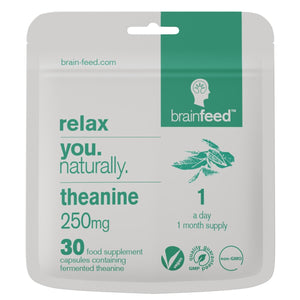L-theanine benefits relaxation without sedation
filter
L-theanine is a natural isolated nutrient from green tea which increases the concentration of the chemical messenger, GABA. GABA’s principal role in the brain is to relax the nervous system without sedation. Each capsule contains the same amount of theanine found in 15 cups of tea.
Ideal for:
- anybody looking to unwind
- anybody looking to relax but maintain mental performance and clarity.
- nervous public speakers or nervous travellers
How does theanine work?
theanine is a fast-acting, non-sedative relaxant which reduces the impact of excitatory pathways in the brain, and in doing so it increases the relative GABA concentrations in the brain.
In human studies, theanine also stimulates the production of alpha brain waves which is indicative of a relaxed but alert mental state [1 Trusted Source 2001 - Fundamental and Clinical Pharmacology Human study A double blind parallel group placebo controlled comparison of sedative and amnesic effects of etifoxine and lorazepam in healthy subjects ] . It is often referred to as wakeful relaxation [2 Trusted Source 2008 - Journal of Nutrition Reviews Research evaluation Psychological effects of dietary components of tea: caffeine and L-theanine. ] exhibiting increased creativity and increased performance under stress as well as decreased anxiety [3 Trusted Source 2008 - Japanese Journal of Physiological Anthropology Research evaluation In Search of a Safe Natural Sleep Aid ] .
In patient groups containing subjects with higher anxiety propensity symptoms, theanine has also been shown to reduce heart rate during stressful mental tasks [4 Trusted Source 2003 - The Korean Journal of Nutrition Human study Effects of Theanine on the Release of Brain Alpha Wave in Adult Males. ] . The relaxation effect of theanine leads to increased GABA concentrations that result in general feeling of calm and wellbeing [5 Trusted Source 1999 - Trends in Food Science & Technology Human study L-theanine—a unique amino acid of green tea and its relaxation effect in humans ] . However, unlike other conventional calming treatments, theanine does not result in increased drowsiness, slowed reflexes, or impaired concentration [4 Trusted Source 2003 - The Korean Journal of Nutrition Human study Effects of Theanine on the Release of Brain Alpha Wave in Adult Males. ] .
It is absorbed into the bloodstream from the intestinal tract and enters the brain through the leucine-preferring amino acid transporter system [6 Trusted Source 2004 - Human Psychopharmacology: Clinical and Experimental Human study The acute effects of L-theanine in comparison with alprazolam on anticipatory anxiety in humans ] . Brain levels increase 30 minutes after ingestion and peak at 5 hours. It does not accumulate in the body but is metabolised in the liver and completely eliminated in the urine within 24 hours. [6 Trusted Source 2004 - Human Psychopharmacology: Clinical and Experimental Human study The acute effects of L-theanine in comparison with alprazolam on anticipatory anxiety in humans ] .
How is it different?
Most L-theanine is synthetic (e.g. Suntheanine) and its produced as a racemic using ethylamine and l-glutamine.
Brain feed’s L- theanine in a 250mg capsule is a natural fermented form. It is kept as pure as possible, so you won’t find additives such as lemon balm whose mechanisms of actions, ability to enter the brain or synergistic benefits is unknown.
Browse natural theanine from only £15.99. Additional 15% off your 1st order using code NEW15.
FAQs
1. What should I notice?
Relaxation without sedation. Oral administration of 200mg of theanine in men aged 20 -25 years old also resulted in a reduction in the heart rate [7 Trusted Source 2015 - Journal of the American College of Nutrition Research evaluation In Search of a Safe Natural Sleep Aid ] .
2. How long does it take to have an effect?
In human studies, increased alpha waves were generated 15 minutes after oral administration [1 Trusted Source 2001 - Fundamental and Clinical Pharmacology Human study A double blind parallel group placebo controlled comparison of sedative and amnesic effects of etifoxine and lorazepam in healthy subjects ] and it has been shown to influence the secretion and function of neurotransmitters 30 minutes after ingestion [6 Trusted Source 2004 - Human Psychopharmacology: Clinical and Experimental Human study The acute effects of L-theanine in comparison with alprazolam on anticipatory anxiety in humans ] . Theertham et al suggest maximum uptake in the brain is usually within 30-40 minutes.
3. How do I take it?
1 capsule with a glass of water. Max 2 per day.
4. Does it help with cognition?
In human studies, theanine alone has shown virtually no positive effect on performance.
however, 250mg of theanine has been found to positively interacted with caffeine to enhance reaction time, the accuracy of rapid information processing, mental fatigue, and tiredness [8 Trusted Source 2006 - Food and Chemical Toxicology Animal study A 13-week dietary toxicity and toxicokinetic study with l-theanine in rats ] . This combination also enhanced the speed of rapid information processing, sentence verification, and word recognition reaction time when caffeine alone did not [9 Trusted Source 2017 - Hepatology Research evaluation Liver injury from herbal and dietary supplements ] .
5. Will it make me sleepy?
No. it does not promote the onset of melatonin and it is not a sedative. Sleep inducers and sedatives normally induce drowsiness or sleep within an hour [10 Trusted Source 1999 - Journal of Agricultural and Food Chemistry Animal study Metabolism of Theanine, γ-Glutamylethylamide, in Rats ] whereas theanine, which achieves its maximum uptake in the brain within 30-40 minutes does not induce any sleep or drowsiness in the subjects [11 Trusted Source 1998 - Neurochemical Research Animal study Effect of Theanine, r-Glutamylethylamide, on Brain Monoamines and Striatal Dopamine Release in Conscious Rats ] .
6. Are there any side effects or contraindications?
Anybody taking medication for high blood pressure should consult their GP. If you have low blood pressure, discuss theanine with your healthcare provider before starting it.
References
[1] Micallef et al. (2001) A double blind parallel group placebo-controlled comparison of sedative and amnesic effects of etifoxine and lorazepam in healthy subjects. Journal of Fundamental Clinical Pharmacology. https://onlinelibrary.wiley.com/doi/10.1046/j.1472-8206.2001.00025.x
[2] Bryan (2008). Psychological effects of dietary components of tea: caffeine and L-theanine. Journal of Nutrition Reviews. https://academic.oup.com/nutritionreviews/article-abstract/66/2/82/1863235?redirectedFrom=fulltext
[3] Ozeki et al. (2008) a study of l-theanine and daytime drowsiness. Japanese Journal of Physiological Anthropology. https://www.tandfonline.com/doi/full/10.1080/07315724.2014.926153
[4] Song et al. (2003) Effects of Theanine on the Release of Brain Alpha Wave in Adult Males. Korean Journal of Nutrition. https://www.koreamed.org/SearchBasic.php?RID=0124KJN/2003.36.9.918&DT=1
[5] Juneja et al. (1999). L-theanine—a unique amino acid of green tea and its relaxation effect in humans. Trends in Food Science & Technology. https://doi.org/https://www.sciencedirect.com/science/article/abs/pii/S0924224499000448?via%3Dihub
[6] Lu et al. (2004) The acute effects of L-theanine in comparison with alprazolam on anticipatory anxiety in humans. Human Psychopharmacology . Clin. Exp. 19, 457–465. https://onlinelibrary.wiley.com/doi/10.1002/hup.611
[7] Theertham et al. (2015) In Search of a Safe Natural Sleep Aid. Journal of the American College of Nutrition. https://www.tandfonline.com/doi/full/10.1080/07315724.2014.926153
[8] Borzelleca et al. (2006) A 13-week dietary toxicity and toxicokinetic study with l-theanine in rats. Food and Chemical Toxicology. https://www.sciencedirect.com/science/article/abs/pii/S0278691506000949?via%3Dihub
[9] Navarro et al. (2017) Liver injury from herbal and dietary supplements. Journal of Hepatology. https://journals.lww.com/hep/fulltext/2017/01000/liver_injury_from_herbal_and_dietary_supplements.36.aspx
[10] Unno et al. (1999) Metabolism of theanine, gamma-glutamylethylamide, in rats. Journal of Agriculture & Food Chemistry. https://pubs.acs.org/doi/10.1021/jf981113t
[11] Yokogoshi et al. (1998) Effect of theanine, r-glutamyethylamide, on brain monoamines and striatal dopamine release in conscious rats. Journal of Neurochemical Research. https://link.springer.com/article/10.1023/A:1022490806093


 alertness
alertness
 cognition
cognition
 sleep
sleep
 wellbeing
wellbeing








Leave a comment
Open tab